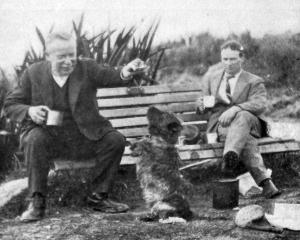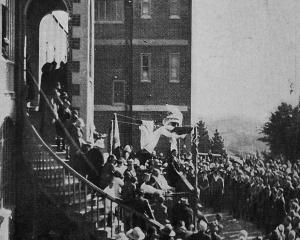It was almost immediately approached by an irate individual who flourished a horsewhip and proceeded to deal out severe punishment to one of the men in the car.
It afterwards leaked out that the gentleman who had administered the punishment was the husband witnessing the departure of his wife with her admirer.
Blood flowed copiously, covering the white costume of the lady, but no attempt was made by the punished man to resist in any shape or form until he and the lady ran on board the boat and sheltered themselves in the steerage compartments.
The husband interviewed the captain of the steamer with a view to getting his wife put off.
In the meantime both the man and the woman had changed their costumes, and it being found that the latter had no ticket the captain insisted on her going ashore to get one.
While she was away the lines were cast off, and the Rarawa sailed away leaving the lady standing at the shipping office door in company with her husband.
• Christchurch: A deputation representing the licensed victuallers waited upon the Hon. James Allen today and protested against the action of a certain portion of the community in making use of the war in order to advance the claims of prohibition and to penalise hotelkeepers.
The Minister, in replying, said that a deputation from the other side would wait on him and ask for 6 o'clock closing.
It was a very difficult problem, and an impossible one for an individual Minister to deal with; it was a subject for the government.
Certain regulations, such as that forbidding liquor on troop trains, had already been imposed, and it was a question for the Government whether further war regulations should be imposed in this direction.
In the meantime he asked the licensed victuallers to help the defence authorities by protecting both recruits and soldiers from their own weaknesses.
If the strong feeling which has grown up in the community continues to grow and a licensing poll was held he did not know what would happen.
He asked the licensed victuallers to act in their own interests as well as in the interests of the young men who joined the forces.
Subsequently a deputation from the W. C. T. U., and a deputation consisting of the Mayor and Dr Chilton waited on the Hon.
Mr Allen and urged the early closing of hotels, to prevent drinking among soldiers.
Failing that, they asked for the early closing of hotels in areas surrounding training camps.
They also asked that all hotels close to convalescent camps should be declared out of bounds.
The Hon. Mr Allen replied that he would resist wet canteens.
He would place the requests before the Cabinet, but the Cabinet did not consider it necessary to take any action at present.
His opinion was that drinking among soldiers was now less than previously.
The main difficulty was with returned soldiers convalescing.
Early closing would not meet the case of these men.
• The Coast Defence Detachment will go into camp for the annual training at Waitati today.
The men will muster at the Dunedin Railway Station at 9 a.m.
The Port Chalmers details will meet the Dunedin men at Upper Junction, and the whole detachment then march to Waitati.
The original intention was to camp at Taiaroa Heads, but on the arrival of tents from Wellington the site at Waitati was selected.
Chaplain-captain Saunders and Mr Hughes, of the Y. M. C. A., will be in camp during the course of training. - ODT, 28.2.1916.












